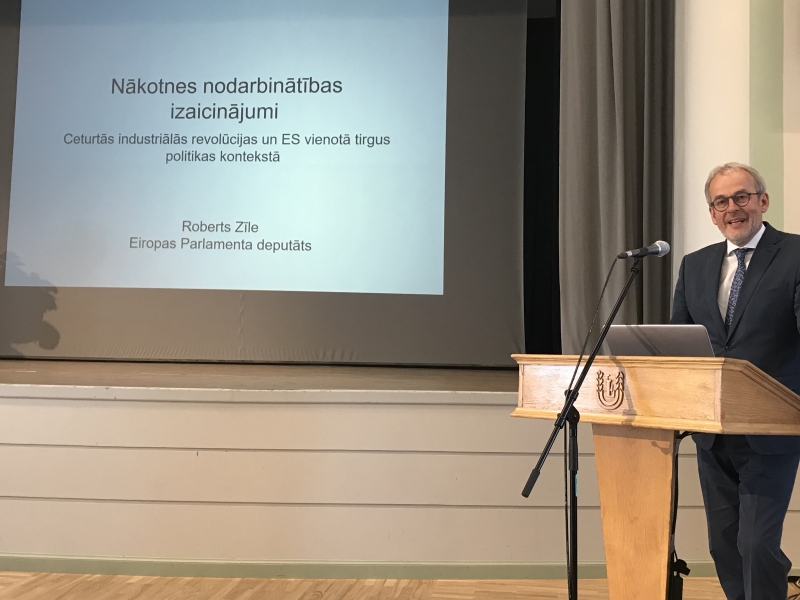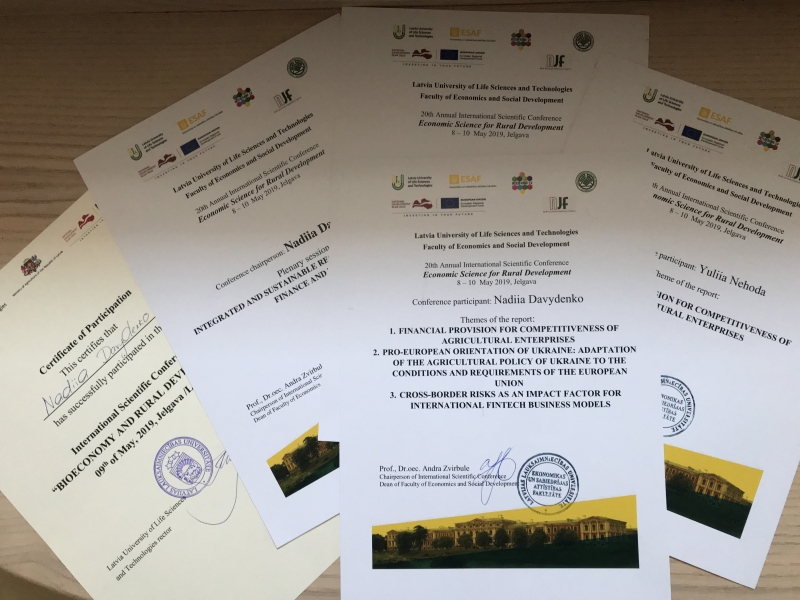Фінансисти університету взяли участь у обговоренні перспектив фінансового забезпечення розвитку сільських територій
Представники кафедри фінансів взяли участь у роботі двох міжнародних науково–практичних конференцій «Bioeconomika and rural development» та «Economic Science for rural development», які проходили в Латвійському університеті наук про життя та технологій, м.Єлгава з 8 по 10 травня.
З вітальним столовом до учасників конференції звернувся проректор університету проф. Aigars Laizans.

Він зазначив, що Латвійський університет наук про життя та технологій є єдиним вищим сільськогосподарським освітнім центром в Латвії, який сприяє розвитку інтелектуального потенціалу сільського розвитку в сільському господарстві; заохочує молодь до отримання вищої академічної та професійної освіти; сприяє розвитку культури.
Проф. Aigars Laizans ознайомив зі структурою університету, в якому працюють 8 факультетів: сільське господарство, ветеринарія, інженерія, харчова технологія, навколишнє середовище та цивільне будівництво, ліс, інформаційні технології, економіка та соціальний розвиток.

Проф. Aigars Laizans відмітив, що міжнародне співробітництво в Латвійському університеті наук про життя та технологій базується на більш ніж 130 укладених угодах про співробітництво з установами-партнерами з 27 європейських країн та 42 діючими двосторонніми угодами з ВНЗ та дослідницькими центрами з 19 країн світу, в тому числі, зазначив й Національний університет біоресурсів і природокористування України.
Проректором університету проф. AigarsLaizans було окреслене коло проблемних питань для роботи Міжнародної науково–практичної конференції «Біоекономіка та розвиток сільських територій».
З вітальним словом до учасників конференції «Bioeconomika and rural development» також звернувся і Голова Департаменту розвитку планування регіонів Dace Vilmane.
Він зазначив, що природа та екологія відіграють велику роль у самосвідомості латвійців та сказав, що Латвія має дуже амбіційну мрію стати найекологічнішою країною у світі. Проте існує ряд проблем, які необхідно вирішити, щоб цього досягти. Зокрема, у Латвії існують екологічні проблеми, і, перш за все, ідеться про вирубку лісу. Ліс для латвійців є джерелом заможності, оскільки близько половини лісів перебуває в приватній власності – це дозволяє латвійським родинам отримувати стабільні прибутки від продажу лісу.
Ще одна проблема, це забруднення Балтійського моря, проте, як зазначив Dace Vilmane, Латвія може вплинути на неї лише частково, приділивши більшу увагу очищенню річок, які дуже обміліли, та які впадають у Балтійське море. У решті питань роль Латвії, на його думку, зведена до підписання міжнародних угод та фінансовій участі в проектах очищення, які реалізують інші країни. В кінці свого виступу він зазначив, що, біоекономічна орієнтація господарської системи дозволить сформувати перспективну стратегію розвитку та прогресивних змін економіки будь-якої країни.

Окреслене коло питань знайшло продовження в наукових дискусіях спікерів конференції «Bioeconomika and rural development» із Польщі, Литви, Норвегії, Латвії, Росії.

Завідувач кафедри фінансів Надія Давиденко презентувала дослідження на тему «Financial support for reproduction of agricultural land».

У своєму виступі по темі дослідження професор Надія Давиденко відзначила, що розвиток природного агровиробництва є однією з базових умов реалізації концепції сталого розвитку в Україні, оскільки використання технологій природного агровиробництва спрямоване з одного боку, на відновлення і захист ґрунтів від виснаження під час використання традиційних технологій з використанням мінеральних добрив, стимуляторів росту, хімічних засобів обробки врожаю тощо, а з іншого боку забезпечує вирощування екологічно безпечної продукції. Тобто, запровадження природного агровиробництва спрямоване на вирішення проблем в сфері екологічної та продовольчої безпеки, що є складовими національної безпеки країни.
Водночас запровадження технологій природного агровиробництва вимагає значних фінансових ресурсів, оскільки є більш ризикованим, порівняно з традиційним агровиробництвом, яке саме по собі має значний рівень ризику як операційної, так, відповідно, і фінансової діяльності. Крім того, перехід від традиційних технологій, до технологій природного агровиробництва займає певний проміжок часу від двох до п’яти років, коли, може знижуватись рівень рентабельності діяльності, а отже зменшується можливість використання позикових коштів та зростання їх вартості з врахуванням рівня ризику.
Інша конференція, що в цьому році була ювілейною «Economic Science for rural development», яку організував Латвійський університет наук про життя та технологій розпочала роботу на наступний день.
Окрім керівництва університету з вітальним словом виступив член Європейського парламенту Roberts Zile.

Він преставив основні проблеми латвійської економіки та зазначив, що в країні дефіцитробочої сили, що змушує турбуватися про довгострокову стійкість зростання економіки, необхідність змін в секторі освіти, науки, доцільності поліпшення політики стимулювання інновацій і ефективності суспільних інвестицій.
В рамках ювілейної ХХ Міжнародної науково–практичної конференції «Economic Science for rural development» професор Надія Давиденко представила доповідь на тему: «Pro – European orientation of Ukraine: adaptation of the agricultural policy of Ukraine to the conditions and requirements of European Union».

У своєму виступі професор Надія Давиденко зазначила, що європейський вибір України спонукає до адаптації вітчизняного аграрного сектора економіки до умов та вимог Європейського союзу. Пріоритети державної аграрної політики щодо стратегічних напрямів розвитку сільського господарства України націлені на інтеграцію аграрного сектора економіки в європейські структури. Переваги означеної інтеграції полягають у створенні надійних механізмів економічної стабільності, фінансової безпеки та сталого розвитку сільського господарства.
Доценти Юлія Негода та Аліна Буряк представили доповідь на тему: «Financial provision for competitiveness of agricultural enterprises», в якій зазначили, що площа сільськогосподарських земель України є найбільшою в Європі та становить 41,5 млн.га (70% території країни), з них - 32,5 млн.га використовуються для вирощування сільськогосподарських культур, тобто є всі підстави стверджувати, що за умови відповідного фінансового забезпечення аграрний сектор економіки України може бути конкурентоспроможним на зовнішніх ринках.


Лариса Олійник,
доцент кафедри фінансів
